On September 8, 2000, President William J. Clinton signed the United Nations Millennium Declaration. The Millennium Declaration is a mandate for global governance.
United Nations Millennium Summit
Millennium Summit September 6-8, 2000
Background on the Millennium Summit A/RES/53/202, February 12, 1999
We the Peoples: the role of the UN in the 21st Century A/54/2000, March 27, 2000
Millennium Declaration, A/RES/55/2, September 18, 2000
Thematic Framework for the Millennium Summit, Report of the Secretary-General, A/53/948 – A/53/948/Add.1
Millennium Report of the Secretary-General of the United Nations *****
International Legal Instruments (The Millennium Summit was a treaty event)
Core group of multilateral treaties ***** Look at them
United Nations Development Program
United Nations Development Program (UNDP)
Millennium Development Goals
1. Eradicate Extreme poverty and hunger
2. Achieve universal primary education
3. Promote gender equality and empower women
4. Reduce child mortality
5. Improve maternal health
6. Combat HIV/AIDS, malaria and other diseases
7. Ensure environmental sustainability
8. Develop a global partnership for development
Factsheet — Millennium Development Goals
Coordinating global and national efforts
UN Secretary-General Kofi Annan has asked UNDP Administrator Mark Malloch Brown, in his capacity as chair of the UN Development Group, to be the coordinator of the Millennium Development Goals in the UN system — to make them an integral part of the UN’s work worldwide.
(That’s LORD Mark Malloch Brown)
Millennium Project
Launched in July 2002, the Millennium Project is an independent advisory project commissioned by UN Secretary-General Kofi Annan and supported by the UN Development Group. Professor Jeffrey Sachs, Special Advisor to the Secretary-General on the Millennium Development Goals and Director of the Earth Institute at Columbia University directs the Millennium Project.
Working in cooperation with developing countries and other partners, the project has set up an expert task force to prepare strategies to help countries achieve the goals by bringing together the best current thinking and research. Its work includes reviewing innovative practices, prioritizing policy reforms, identifying means of policy implementation and evaluating financing options.
Millennium Campaign
The Millennium Campaign aims to mobilize North and South to achieve the MDGs. While the MDGs are already serving as a development framework for many global and national initiatives, there is still untapped support for the MDGs in developing and developed countries alike.
 Making Global Trade Work for People
Making Global Trade Work for People
Goal 8 – Develop further an open trading and financial system that is rule-based, predictable and non-discriminatory. Includes a commitment to good governance, development and poverty reduction—nationally and internationally
Financing for Development
International Conference on Financing for Development, Monterrey, Mexico
March 2002
UN Report of the International Conference on Financing for Development, Monterrey, Mexico, 18-22 March 2002 (A/CONF.198/11)
Monterrey Consensus alternate link Monterrey Consensus
Financing for Development – Building on Monterrey
The “Monterrey Consensus” adopted by the Conference embodied the principle of a holistic and integrated approach to the multidimensional nature of the global development challenge. The Consensus launched the Financing for Development follow-up process that continues to date.
Foreign Direct Investment flows BOTH WAYS. But of course, people who only have uni-directional brains wouldn’t think of that.
Excerpts from the Monterrey Consensus (local copy):
20. Private international capital flows, particularly foreign direct investment, along with international financial stability, are vital complements to national and international development efforts. Foreign direct investment contributes toward financing sustained economic growth over the long term.
23. While Governments provide the framework for their operation, businesses, for their part, are expected to engage as reliable and consistent partners in the development process. We urge businesses to take into account not only the economic and financial but also the developmental, social, gender and environmental implications of their undertakings. . .
International trade as an engine for development
Vincente Fox,
Address to a Joint Session of Congress
September 6, 2001
George W. Bush, remarks at the Summit of the Americas in Quebec Canada, April 21, 2001.
White House Press Release, Fact Sheet, April 21, 2001
Democracy: Strengthening democratic governance is a focus of the Summit of the Americas process. The leaders of the hemisphere are committed to promoting the rule of law and democratic institutions such as independent judiciaries, reliable electoral systems, dependable law enforcement organizations, and efficient banking and social services.
Free Trade Area of the Americas (FTAA): The FTAA will extend the benefits of free trade to countries throughout the Hemisphere. When completed, the FTAA will be the largest free trade area in the world, with a combined GDP of more that $10 trillion and 800 million people. The Bush Administration is committed to concluding FTAA negotiations by January 2005 and to implement the agreement no later than December 2005. The President will seek Trade Promotion Authority (TPA) from the U.S. Congress to enable his Administration to negotiate trade agreements more easily.
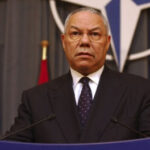 Colin Powell, Secretary of State
Colin Powell, Secretary of State
On September 11, 2001, Secretary of State, Colin Powell was in Lima, Peru to sign the Inter-American Democratic Charter. John Graham of the Canadian Foundation for the Americas (FOCAL) wrote an article titled A Magna Carta for the Americas The Inter-American Democractic Charter: Genesis, Challenges and Canadian Connections about the charter.
Summit of the Americas
Secretariat
In 2000, the countries of the hemisphere began the preparations for the Third Summit of the Americas, held in Quebec City, Canada, April 20-22, 2001. The Summit emphasized 18 themes resulting in the adoption of 254 mandates on issues including Democracy, Human Rights, Justice, Hemispheric Security, Civil Society, Trade, Disaster Management, Sustainable Development, Rural Development, Growth with Equity, Education, Health, Gender Equality, Indigenous Peoples, Cultural Diversity, and Children and Youth.
President George W. Bush, Remarks at the Inter-American Development Bank, March 14, 2002
Along with many of you, I’ll be in Monterrey, Mexico, next week as leaders from around the world focus on the important work of reducing global poverty.
. . . In World War II, we fought to make the world safer, then worked to rebuild it. As we wage war today to keep the world safe from terror, we must also work to make the world a better place for all its citizens.
The advance of development is a central commitment of American foreign policy.
. . . The foundation of development is security, because there can be no development in an atmosphere of chaos and violence. Today, the United States is leading a broad and vast coalition defending global security by defeating global terror.
Development also depends upon financing. Contrary to the popular belief, most funds for development do not come from international aid; they come from domestic capital, from foreign investment, and especially from trade.
U.S. Millennium Challenge Corporation
Institutionalized robbery of the U.S. Treasury and the American people began when the Bush Administration proposed legislation to Congress to establish the Millennium Challenge Corporation and Millennium Challenge Account.
President’s Letter Conveying MCA Legislation to the Congress, February 5, 2003
By request, Senator Richard Lugar sponsored legislation for the proposal.
Also transmitted to the Congress on February 5, 2003 was a Section-by-Section Analysis
On March 6, 2003, Senator Lugar introduced S.571 legislation in Congress – The Millennium Challenge Act of 2003.
S.571 did not go through the committee process in Congress. The legislation was slipped into the Consolidated Appropriations Act of 2004 which did become Public Law No. 108-199.
The Millennium Challenge Act established the Millennium Challenge Corporation.
To establish the Millennium Challenge Account and the Millennium Challenge Corporation in order to reduce global poverty through increased economic growth by supporting a new compact for global development.
(a) Establishment of the Millennium Challenge Corporation.–There is hereby established in the executive branch, a corporation to be known as the Millennium Challenge Corporation (hereinafter in this Act referred to as the “Corporation”).
(b) Responsibility of the Corporation.–It shall be the responsibility of the Corporation to implement title I of this Act, consistent with the direction of the President.
SEC. 202. MANAGEMENT OF THE CORPORATION.
(a) Board of Directors.–The management of the Corporation shall be vested in a board of directors (hereinafter in this title referred to as the “Board“) composed of the Secretary of State, who shall Chair, the Secretary of the Treasury, and the Director of the Office of Management and Budget, and may include individuals serving in such positions in an acting capacity.
Washington Post, August 10, 2004 : Reinventing US Foreign Aid at Millennium Challenge Corp.
First Board of Directors for the Millennium Challenge Corporation.
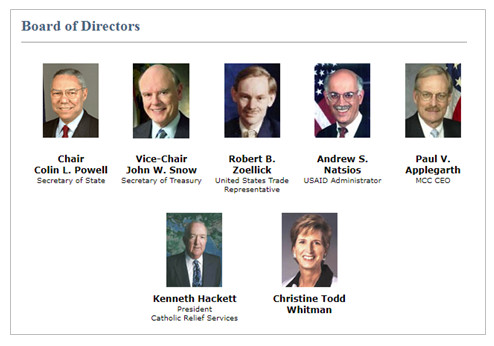
The MCC Board of Directors is comprised of the Secretary of State, the Secretary of the Treasury, the U.S. Trade Representative, the Administrator of USAID, the CEO of MCC and four private sector members appointed by the President of the United States with the advice and consent of the U.S. Senate.
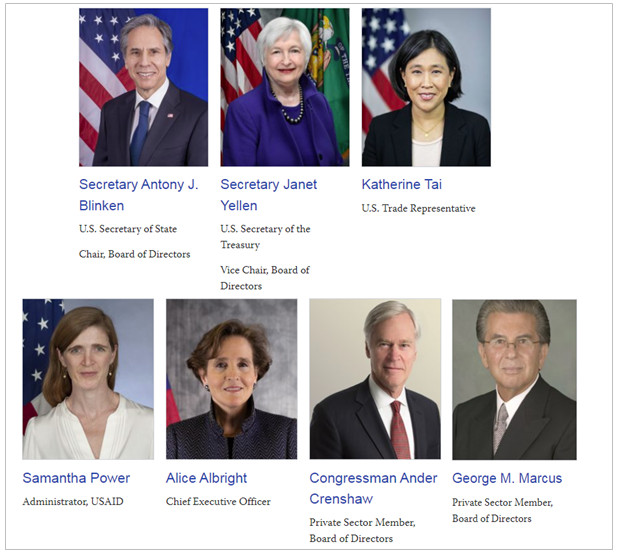
2005 legislation S.1315 – International Cooperation to Meet Millennium Development Goals Act of 2005, Senator Richard Lugar; didn’t pass but funding for the Millennium Challenge Corporation was included in S.2812 – Foreign Operations, Export Financing, and Related Programs Appropriations Act, 2005, sponsored by Mitch McConnell. It became Public Law 108-447. Since the Millennium Challenge Corporation is still in business to this day, we can assume appropriations to fund it have been included in legislation ever since.
George W. Bush
September 12, 2002
Speech to the United Nations
United Nations
System of Security
extend trade
bring medical care to where it is needed
US will return to UNESCO
Advance Human Rights
Tolerance
Learning
Support for Palestine
Common Security threatened by
The American government no longer works for the American people. Internationalists have consumed the American government putting us under an international system that very few people even understand. The evidence is all around us if only we choose to look.

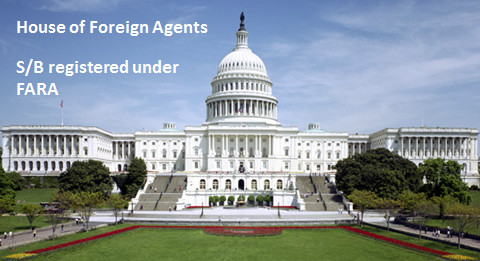
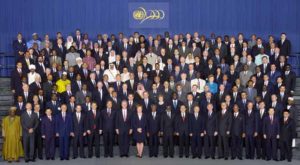
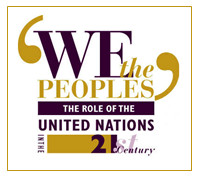
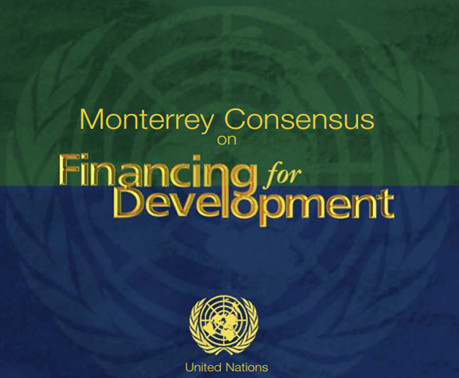
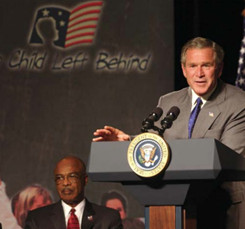
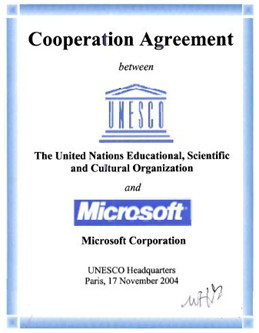

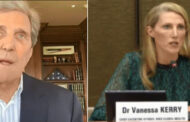

One Comment
Pingback: Agenda 21 and the Green Meanies Part 8 – patriotmongoose